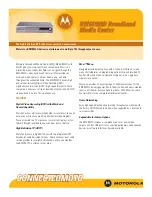
H
DCVI Standalone DVR User’s Manual
131
For digital channel, there are five alarm types. See Figure 4-100 through Figure 4-104.
Local alarm: The alarm signal system detects from the alarm input port.
Network alarm: It is the alarm signal from the network.
HDCVI: System can get the camera temperature, smoke, external alarm and set
corresponding alarm activation operation.
IPC external alarm: It is the on-off alarm signal from the front-end device and can
activate the local HDVR.
IPC offline alarm: Once you select this item, system can generate an alarm when the
front-end IPC disconnects with the local HDVR. The alarm can activate record, PTZ,
snap and etc. The alarm can last until the IPC and the HDVR connection resumes.
Important
If it is your first time to boot up the device, the disconnection status of
the front-end network camera will not be regarded as offline. After one
successfully connection, all the disconnection events will be regarded
as IPC offline event.
When IPC offline alarm occurs, the record and snapshot function of
digital channel is null.
Alarm in: Here is for you to select channel number.
Type: normal open or normal close.
PTZ activation: Here you can set PTZ movement when an alarm occurs. Such as go
to preset, tour& pattern when there is an alarm. Click “select” button, you can see an
interface is shown as in Figure 4-105.
Period: Click set button, you can see an interface is shown as in Figure 4-106. There
are two ways for you to set periods. There are max 6 periods in one day. There are
four record types: regular, motion detection (MD), Alarm, MD & alarm.
In
Figure 4-106, Select icon
of several dates, all checked items can be
edited together. Now the icon is shown as
.
Click
to delete a record
type from one period.
In
Figure 4-106. Click button
after one date or a holiday, you can see an
interface shown as in Figure 4-107. There are four record types: regular, motion
detection (MD), Alarm, MD & alarm.
Anti-dither: Here you can set anti-dither time. Here you can set anti-dither time. The
value ranges from 5 to 600s. The anti-dither time refers to the alarm signal lasts time.
It can be seem as the alarm signal activation stays such as the buzzer, tour, PTZ
activation, snapshot, channel record. The stay time here does not include the latch
time. During the alarm process, the alarm signal can begin an anti-dither time if
system detects the local alarm again. The screen prompt, alarm upload, email and etc
will not be activated. For example, if you set the anti-dither time as 10 second, you
can see the each activation may last 10s if the local alarm is activated. During the
process, if system detects another local alarm signal at the fifth second, the b uzzer,
tour, PTZ
activation, snapshot, record channel will begin another 10s while the
Summary of Contents for DVR-CVIC32960C-DH
Page 21: ...HDCVI Standalone DVR User s Manual 37 2 3 Connection Sample DVR CVIC32960C DH...
Page 107: ...HDCVI Standalone DVR User s Manual 126 Figure 4 93 Figure 4 94...
Page 114: ...HDCVI Standalone DVR User s Manual 133 Figure 4 100 Figure 4 101...
Page 115: ...HDCVI Standalone DVR User s Manual 134 Figure 4 102 Figure 4 103...
Page 116: ...HDCVI Standalone DVR User s Manual 135 Figure 4 104 Figure 4 105...
Page 126: ...HDCVI Standalone DVR User s Manual 145 Figure 4 121 Figure 4 122...
Page 132: ...HDCVI Standalone DVR User s Manual 151 Figure 4 130 Figure 4 131 4 10 4 5 Quota...
Page 147: ...HDCVI Standalone DVR User s Manual 166 Figure 4 150 Figure 4 151 4 10 5 6 ATM POS...
Page 190: ...HDCVI Standalone DVR User s Manual 209 Figure 5 55 Figure 5 56 Figure 5 57...
Page 200: ...HDCVI Standalone DVR User s Manual 219 Figure 5 72 Figure 5 73 Figure 5 74...
Page 202: ...HDCVI Standalone DVR User s Manual 221 Figure 5 75 Figure 5 76...
















































